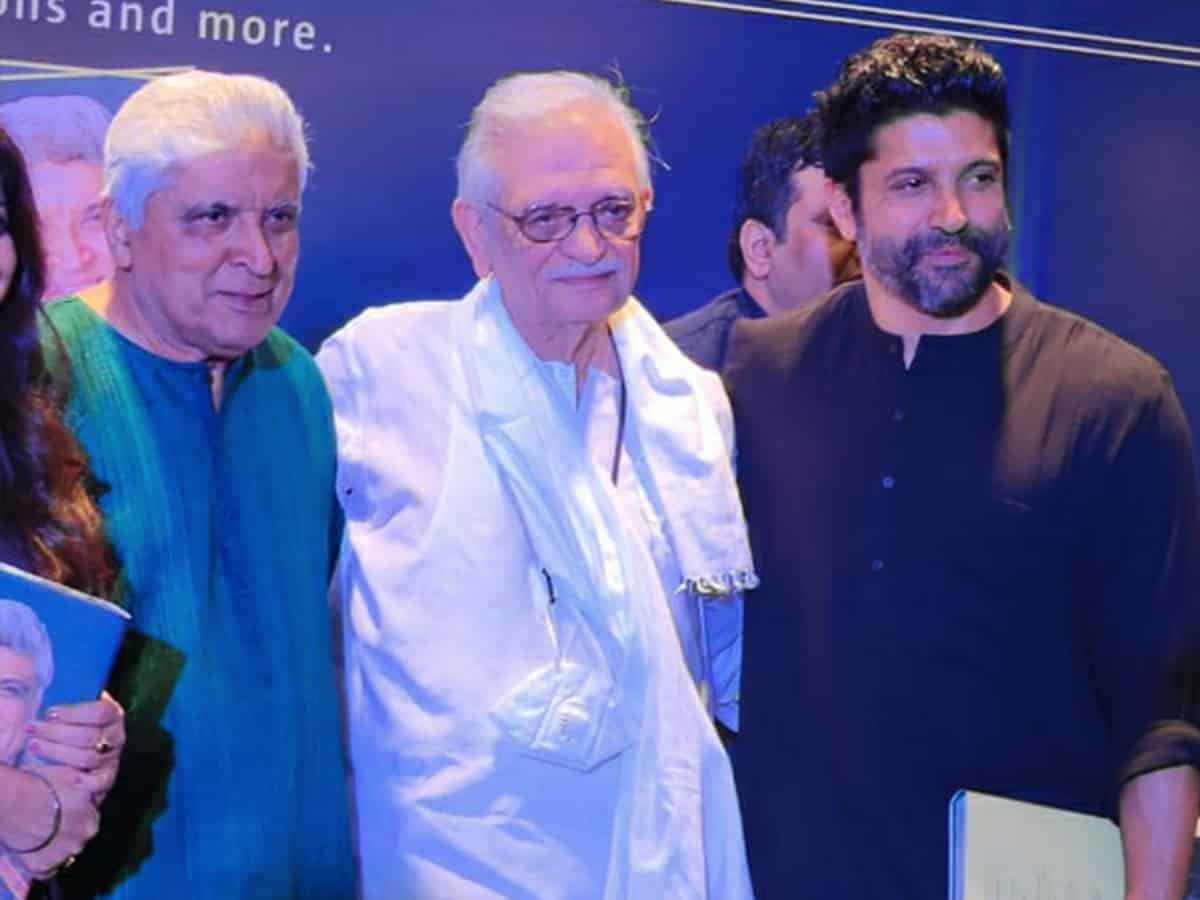
Most of us cannot decide who between Gulzar and Javed Akhtar is a better poet-lyricist. So, when the two legends shared the stage at the launch of Jadunama: Javed Akhtar’s Journey, written by Arvind Mandloi and translated by Rakhshanda Jalil, in Mumbai recently, they regaled the audience with their witty talks, interesting anecdotes, and words of mutual admiration. But before we talk about the relationship and bonhomie between these two doyens of shairi, let us first stay with Javed Sahab’s journey.
Javed sahab lost his mother (Safia Akhtar) when he was all of 8. Initially named Jadoo (magic), he was renamed Javed (Eternal), Akhtar (Star)—Eternal Star. He proved to be what they call in Persian, Ism-baa-musamma, meaning name fully denoting the qualities of the named person. Few writers and poets have had such a long, successful inning in Bollywood–an eternal star indeed.
Losing mother at such a young age, Javed Sahab never allowed adversity to dim his jazba or zeal to reach his goal. And the dream that kept the boy–educated at Lucknow, Aligarh and Bhopal– bechain (restless) was to become rich.
Shabana Azmi and Farhan Akhtar read out passages from the book and stories and gave us glimpses from his life. Javed Sahab got off a train at Bombay Central in the late 1960s with a few coins in his pocket but an indomitable courage and indefatigable spirit in heart to change his conditions. He did meet his father poet-lyricist Jan Nisar Akhtar but left his place in a couple of days and decided to fend for himself. Living virtually without a roof over his head for months, he did whatever little work came his way in the initial days.
He also slept in a room at Kamal Amrohi-owned Kamalistan Studio. There were many almirahs in that room and, one night, while the world slept outside, Javed Akhtar opened an almirah which had three Filmfare Awards of Meena Kumari. This was the first time he had touched a Filmfare Award. “One day these will be mine too,” the young, aspiring poet-writer told himself. Such confidence? For how long could destiny play hide and seek with him? For how long could he have remained faceless and hungry? He paired with Salim Khan and together Salim-Javed created a phenomenon called Angry Young Man (Amitabh Bachchan). The rest, as the cliché goes, is cinematic history.

Destiny smiled on him. Not that he believes in qismat because, to him, it is superstition. Many people talk about his confession of being an atheist. And this evening I decided to get it from the horse’s mouth. Once they all had spoken and the very articulate, intelligent and charming anchor Atika Frooqui opened the session for question-answer, I fired the first salvo. Before the question-answer session began, Gulzar sahab said that Javed Sahab never fights with anyone though he may get angry and burst out in anger. Gulzar Sahab, in his trademark white kurta-pyjama (mujhe log mere kapde se pahchante hain, joked Gulzar Sahab), denied if he has had any rivalries with Javed Sahab. “He completed his college education but I failed and dropped out. His command over zuban is better than mine. His memory is sharp, has memorised at least 1 lakh couplets and can recite long poems and quote long passages from a story from memory,” complimented Gulzar Sahab.
Once Gulzar Sahab needed Sahir Ludhianvi’s collection of poems Parchchaiyan (Shadows) and could not find as it had got misplaced. He called Javed Sahab to enquire if he had it. “Ji boliye, kya chahiye Parchchiyan se, kaun si nazm chahiye, abhi padh deta hoon,” Javed Sahab replied. That is how sharp his memory is, my dear friends.
“Words fail me to describe Javed Sahab,” said Gulzar Sahab.
Both the writer and translator explained their happy experiences while working on this fascinating book.
And the question-answer session began. Introducing myself, I recalled another book launch function years ago where Dr Rafiq Zakaria was in conversation with Khushwant Singh. It was launch of Zakria’s book Discovery of God at the Taj Mahal Palace hotel in South Mumbai. Zakaria and Khuswant Singh were good friends. Commenting on Singh’s known agnosticism, Zakaria said and I quoted: “Khushwant Singhji, make peace with God and I can assure you a place in paradise.” Khuswant Singh had a hearty laugh.
“Both Khushwant Singh and Dr Zakaria are gone. I am not Dr Zakaria and I cannot promise a place in Jannat to you. But many people ask me about your fights with God. So, please tell me Khuda se apka jhagda kyun hai?,” I asked. “Jannat mein kela nahin milta (there is no banana in paradise),” he joked. A huge laughter filled the room. “But that is a joke. Tell us about your ideological fight,” I asked. “Many people ask me why I am an atheist. I am an atheist because I think,” he said.
Like they do with a rockstar, youngsters his granddaughters’ age whipped out their smartphones to take selfies with Javed Sahab. Men and women queued up to get their copies signed by him. Paparazzi and Television reporters jostled to click pics and get his bites. How many writers his age (77 years) can match such popularity?
And when I saw Javed Sahab being driven off in an SUV, I thought of that 8-year-old boy, crying near his dead mother’s body. His mother must have watched from heaven, feeling proud of a son who didn’t let privation chain him. Her son’s alfaz ka jadoo sar chadh kar bol raha hai.
We love you, Javed sahab.



